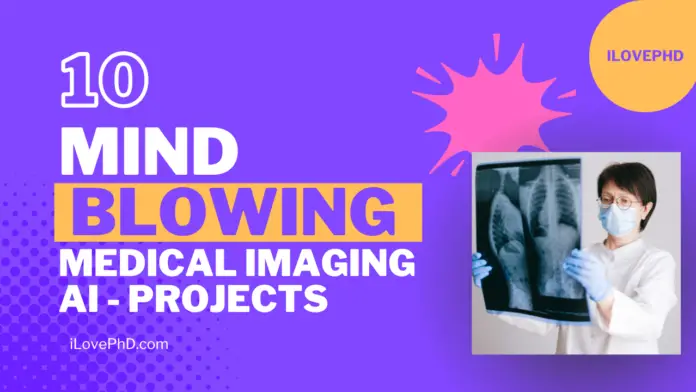Medical imaging has come a long way since the first X-ray was taken in 1895. Today, artificial intelligence is pushing the boundaries of what’s possible in diagnostics, treatment planning, and patient care. In this article, we’ll explore 10 cutting-edge AI projects that are revolutionizing medical imaging and changing the face of healthcare as we know it.
10 Cutting-Edge AI Projects Revolutionizing Medical Imaging
1. DeepMind’s AI for Breast Cancer Detection
DeepMind, a leading AI research company, has developed an AI system that can detect breast cancer in mammograms with greater accuracy than human radiologists. In a study published in Nature, the AI demonstrated a reduction in false positives by 5.7% and false negatives by 9.4%. This breakthrough could lead to earlier detection and improved outcomes for breast cancer patients worldwide.
2. IBM Watson’s Imaging AI for Cardiovascular Disease
IBM Watson Health has created an AI-powered imaging tool that can analyze cardiac MRI images to assess heart function and detect cardiovascular diseases. This technology helps cardiologists make more accurate diagnoses and develop personalized treatment plans for patients with heart conditions.
3. NVIDIA’s AI-Accelerated MRI Reconstruction
NVIDIA has developed an AI algorithm that can dramatically speed up MRI scans. By using deep learning to reconstruct images from less data, this technology can reduce scan times by up to 8 times. This means shorter wait times for patients and increased accessibility to vital diagnostic tools.
4.Google’s AI for Lung Cancer Detection
Google has created an AI model that can detect lung cancer in CT scans with a higher accuracy rate than human radiologists. In a study published in Nature Medicine, the AI demonstrated a 5% reduction in false positives and an 11% reduction in false negatives. This technology has the potential to save countless lives through early detection of one of the deadliest forms of cancer.
5. Stanford’s AI for Pediatric Bone Age Assessment
Researchers at Stanford University have developed an AI system that can accurately determine a child’s bone age from X-ray images. This technology automates a time-consuming manual process and helps clinicians assess growth disorders and plan treatments more efficiently.
6. MIT’s AI for Early Alzheimer’s Detection
MIT researchers have created an AI model that can detect early signs of Alzheimer’s disease in brain scans years before symptoms appear. By analyzing subtle patterns in MRI data, this technology could enable earlier interventions and potentially slow the progression of this devastating neurological disorder.
7. Harvard’s AI for Tumor Boundary Detection
Scientists at Harvard Medical School have developed an AI system that can accurately identify tumor boundaries in brain scans. This technology assists neurosurgeons in planning more precise surgeries, potentially improving outcomes and reducing complications for patients with brain tumors.
8. UC Berkeley’s AI for Low-Dose CT Imaging
Researchers at UC Berkeley have created an AI algorithm that can enhance low-dose CT scans, producing high-quality images while reducing radiation exposure for patients. This technology could make CT scans safer and more accessible, particularly for pediatric patients and those requiring frequent imaging.
9. Oxford’s AI for Automated Echocardiogram Analysis
A team at the University of Oxford has developed an AI system that can analyze echocardiograms and provide automated measurements of heart function. This technology could help address the global shortage of trained echocardiographers and improve access to cardiac care in underserved areas.
10. Mayo Clinic’s AI for Personalized Radiotherapy Planning
The Mayo Clinic has created an AI-powered system that can generate personalized radiotherapy plans for cancer patients. By analyzing CT scans and other patient data, this technology can optimize treatment plans to maximize tumor destruction while minimizing damage to healthy tissues.
FAQs
Q: How accurate are these AI imaging systems compared to human experts?
A: Many of these AI systems have demonstrated accuracy rates that match or exceed those of human experts. For example, Google’s lung cancer detection AI showed a 5% reduction in false positives and an 11% reduction in false negatives compared to radiologists.
Q: Will AI replace radiologists and other medical imaging specialists?
A: It’s unlikely that AI will completely replace human experts. Instead, AI is expected to augment and assist medical professionals, helping them work more efficiently and accurately.
Q: Are these AI imaging technologies currently available in hospitals?
A: Some of these technologies are already being implemented in select hospitals and research centers. However, widespread adoption will take time as the technologies undergo further testing and regulatory approval.
Q: How do these AI systems protect patient privacy?
A: AI developers are working closely with healthcare institutions to ensure patient data is protected. Many systems use anonymized data for training and adhere to strict privacy regulations like HIPAA.
Q: Can these AI technologies be used with existing medical imaging equipment?
A: In many cases, these AI systems can be integrated with existing imaging equipment through software updates. However, some advanced applications may require new hardware or specialized equipment.
Conclusion
The 10 cutting-edge AI projects we’ve explored are just the tip of the iceberg in the rapidly evolving field of medical imaging. As these technologies continue to develop and new innovations emerge, we can expect to see significant improvements in disease detection, treatment planning, and patient outcomes. The future of healthcare is being shaped by the power of artificial intelligence, promising a world where diagnosis is faster, more accurate, and more accessible than ever before.

